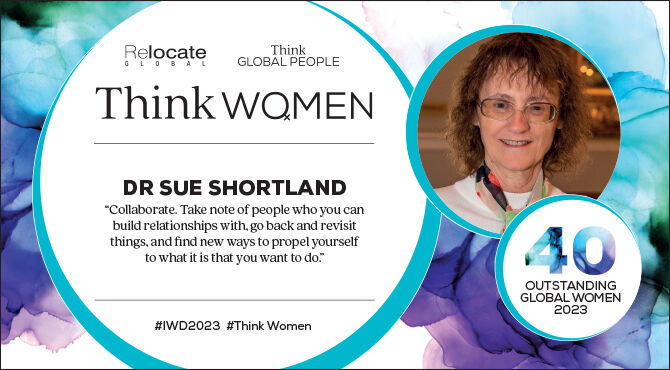Think Women’s 40 Outstanding Global Women – Dr Sue Shortland
Dr Sue Shortland is bridging the gap between theory and practice in global mobility. During her career across the corporate world, research and teaching, women’s participation in international assignments – important for promotion to senior levels – has edged up such that women now hold 35% of expatriate roles.


Related reading from Relocate Global
- Think Women’s 40 Outstanding Global Women 2023 - Julia Palmer, Santa Fe Relocation
- Think Women’s 40 Outstanding Global Women 2023 - Ann Ellis, Mauve
- Think Women’s 40 Outstanding Global Women 2023 - Dr Anino Emuwa, Avandis Consulting

Lifelong learning in theory and practice
Sue – the first of her family to go to university – graduated from Cambridge University in the late 1970s. Her first role was at Incomes Data Services (IDS) in the Studies department. This offered Sue a unique insight into hundreds of organisations’ HR practices. It was to prove the foundation for a lifelong career focused on mobility and diversity, equality and inclusion.“I did quite a lot of research then into things like diversity and studies in race relations,” says Sue. “I also examined mobility, which is where some of my early forays into global mobility and diversity came.”After IDS, Sue went on to work for Personnel Executive as the deputy editor. “Again, there I tended to write on things that were diversity or mobility related.” Her next move was to Industrial Relations Services (IRS), an organisation which offered valuable and robust benchmarking data to employers, government and unions. “I was in this role for 18 months working on issues to do with pay and writing for the Equal Opportunities Review.”To consolidate her expertise, Sue studied for her CIPD qualifications while at IDS and Personnel Executive. “I did the post-grad diploma in Personnel Management,” says Sue. “That pushed me down the HR track. Once you’re on it, you kind of stay on it.” Sue also wrote her first book on managing relocation while at IRS, which was published by Macmillan.Her next step followed an approach from the CBI to run its newly formed Employee Relocation Council, where Sue was to stay for the next ten years before taking maternity leave.Investing in knowledge
Sue “is always doing something.” This continued during her maternity leave when she received two senior-level corporate job opportunities as well as a teaching role.“A friend of mine who was a lecturer at Westminster University said, ‘you know all this stuff about global mobility and international HRM; would you be a guest lecturer?’ So, I did some of that.”“Then I was offered two similar jobs, but chose to go to KPMG to help with its newly launched UK-based international HR research consultancy.” While at KPMG for the next two years, Sue studied for her post-graduate diploma in Higher Education, which led on to her second Master’s degree.“I enjoyed going into the university to teach more than I enjoyed going in to be a consultant,” says Sue.Stepping off the corporate career ladder into academia saw Sue rise through the ranks here, too to associate dean of the Business School at London Metropolitan University, before ‘retiring’ after 17 years as a professor emerita. She returned to academia after a short break to take up a part-time research and teaching role at the University of Westminster.Sue was – and still is – also involved as a spokesperson for the global mobility sector and a judge for Relocate Global Think Global People awards.The future
As a hint of where the global mobility, people and inclusion agendas are going next – especially with the overlaps between DEI and environmental, social and governance (ESG) agendas becoming clear – Sue – far from retiring – is currently, “doing quite a lot of work on top/executive pay determination and the role of remuneration committees. I’m working on an article about diversity and remuneration, and corporate governance.“Really my main focus is on getting research published. That’s what I really like doing. Obviously then bringing research into the teaching in the hope of inspiring students to do research and so on.”The importance of evidence-based decision-making – especially with the amount of data to hand today – is something Sue is particularly keen to promote. “It would be wonderful if HR people read academic peer-reviewed journals. Every single research paper you write is not just about theory. There are always implications for practice.”“If, as an academic like me, you can find an avenue for academic research that is more practitioner-oriented – like Relocate Global – you can start tailoring the research and findings to an HR readership. Busy HR people can read academic research when they are turned into a more practitioner-friendly format and it’s available online or in magazines like Think Global People.”“I’m always trying to get HR and GM professionals to think beyond what they’ve always done and to see things with a much wider perspective, which I think is what Think Global People magazine, is really good at.” In terms of the advice Sue can offer other women on how to navigate their careers, Sue says: “Collaborate. Take note of people who you can build relationships with, go back and revisit things, and find new ways to propel yourself to what it is that you want to do.”Sign up now at events@relocatemagazine.com and subscribe to our newsletters to find out more.
Back to Think Women’s 40 Outstanding Global Women 2023



Subscribe now to Think Global People magazine and read more from Marianne Curphey on women leaders and Ruth Holmes on the talent agenda for 2023 in the brand-new winter issue
©2026 Re:locate magazine, published by Profile Locations, Spray Hill, Hastings Road, Lamberhurst, Kent TN3 8JB. All rights reserved. This publication (or any part thereof) may not be reproduced in any form without the prior written permission of Profile Locations. Profile Locations accepts no liability for the accuracy of the contents or any opinions expressed herein.






























